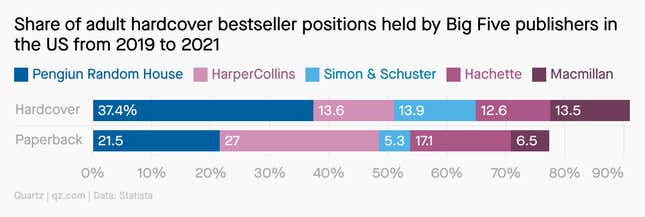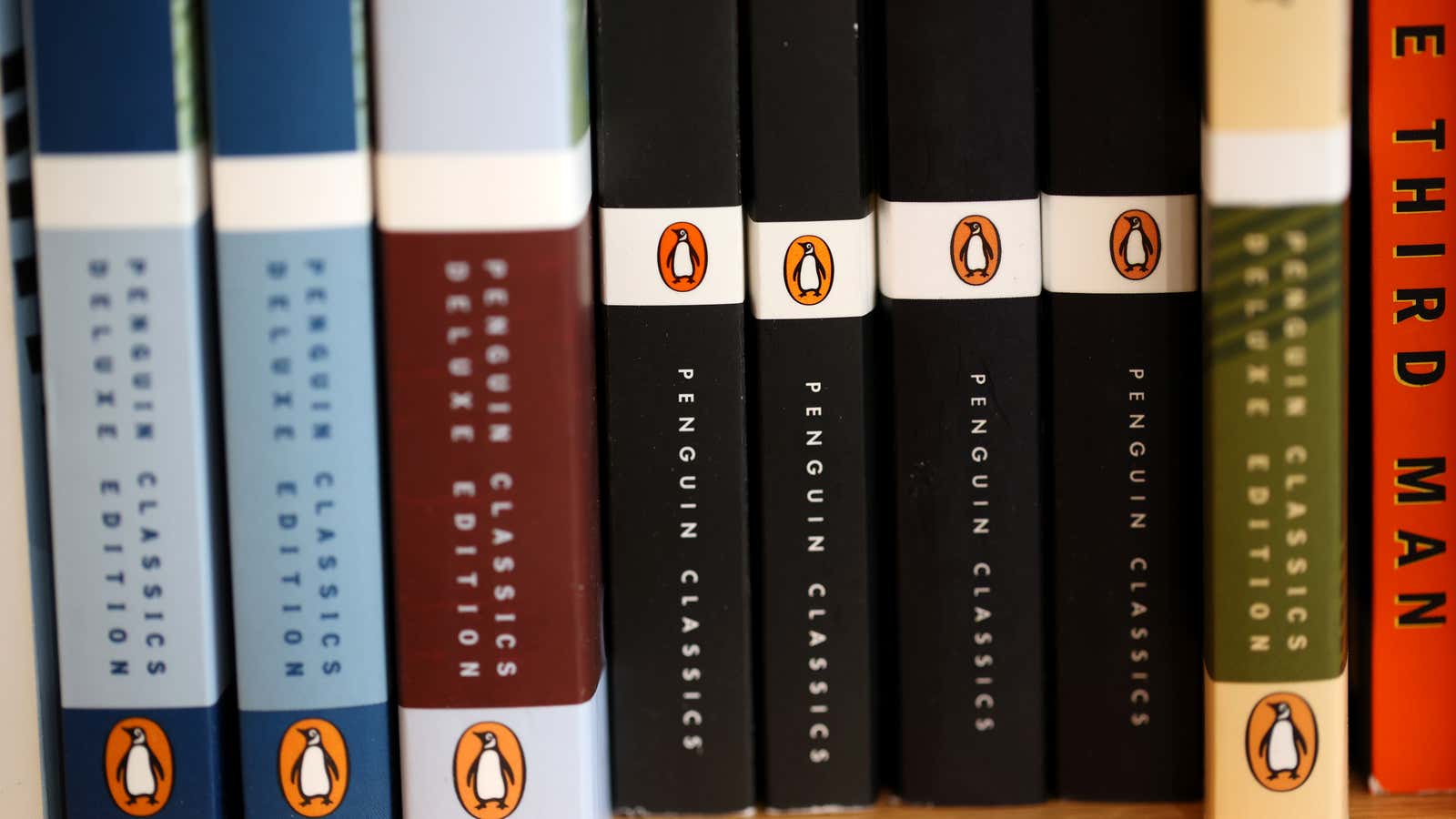Antitrust scrutiny is getting in the way of the world’s largest book publisher buying its rival.
Judge Florence Pan of the US district court for the District of Columbia blocked the planned merger of Penguin Random House (PRH) and Simon & Schuster (S&S) yesterday (Oct. 31).
She said she saw merit in the US justice department’s concerns that the effect of the merger may be “to substantially lessen competition” for authors for “top-selling books” trying to navigate the US publishing industry—a novel consideration for antitrust cases, which usually look at the impact of lessened competition on consumers.
The decision is a big win for the Biden administration’s antitrust enforcement. “Today’s decision protects vital competition for books and is a victory for authors, readers, and the free exchange of ideas,” assistant attorney General Jonathan Kanter said in a statement. “The proposed merger would have reduced competition, decreased author compensation, diminished the breadth, depth, and diversity of our stories and ideas, and ultimately impoverished our democracy.”
The involved parties have until Nov. 4 to post reactions to the judgment. Penguin Random House is likely to appeal the decision.
A brief timeline of Penguin’s attempts to buy Simon & Schuster
November 2020: German publishing giant Bertelsmann’s subsidiary PRH proposes the acquisition of Viacom CBS (now Paramount Global) subsidiary S&S for nearly $2.2 billion
November 2021: The Department of Justice (DOJ) files a lawsuit to block the merger alleging antitrust concerns.
August 2022: The case goes to trial
November 2022: Pan blocks the merger
An antitrust twist in the Justice Department’s case
Typically, authorities go after companies for killing competition for consumers, resulting in higher prices and shoddier products and services. But in this case, the DOJ is fighting to protect workers—specifically, authors.
To understand this, you need to understand two terms:
- Monopoly: When there’s one seller (publisher) for multiple buyers (readers), so the seller can decide the price.
- Monopsony: When there’s one buyer (publisher) for multiple sellers (authors), so the buyer can decide the price.
The DOJ’s case largely rests on the latter. As a Goliath mega-publisher, the combined entity would “exert outsized influence over which books are published in the United States and how much authors are paid for their work.” If PRH and S&S combine forces, they would be publishing one-third of all the books in the US each year, the Wall Street Journal estimated.
Currently, authors typically choose between just five big publishing houses who have the resources to offer high advances and extensive editorial and marketing support. If this number is cut down to four, it would leave hundreds of individual authors “with fewer options and less leverage” to be “fairly compensated.”
However, this entire argument hinges on publishers’ savvy. So, Penguin Random House’s argument has strangely hinged on claiming incompetence and luck, and saying “success is random.”
Charted: US publishing’s big five

Quotable: Stephen King is happy the merger’s been blocked
“Further consolidation would have caused slow but steady damage to writers, readers, independent booksellers, and small publishing companies. Publishing should be more focused on cultural growth and literary achievement and less on corporate balance sheets.” —Stephen King, author of numerous best-sellers like It, The Stand and The Shining, who took the stand during the trial to say “consolidation is bad for competition,” in a New York Times interview
Time machine: Fallout from the Penguin and Random House merger
A closer look at the high-profile 2013 merger of Penguin and Random House reveals the darker side of such consolidation.
🚪In a shocking move, it shuttered a prestigious imprint—brand or trade name of a press owned by a larger publisher—14-year-old Spiegel & Grau, which boasted a line-up of authors like journalist Ta-Nehisi Coates, The Daily Show host Trevor Noah, and even rapper JAY-Z. The two founders, Julie Grau and Cindy Spiegel, relaunched the independent publishing line in 2021 but their decades of corporate experience helped. Other smaller imprints may not survive. (Penguin typically publishes 2,000 new titles across 90 imprints in a given year; Simon & Schuster publishes 1,000 across 30.)
🪓While there were no immediate layoffs, the combined entity reconfigured warehouse operations and fired some 286 employees after a year. The company attributed the downsizing to a decline in physical book sales. This time around, PRH has said it will preserve “each imprint’s identity and independence” but that doesn’t mean layoffs are off the table
📚Past consolidations have affected authors adversely, leading to canceled contracts or manuscripts changing hands during mergers. For one author, it was a “devastating” experience that set her career back several years and cost her a lot of money, she told Esquire under the condition of anonymity
Someone has to buy Simon & Schuster
Paramount Global is divesting from Simon & Schuster no matter what. So if not PRH, it has to find another buyer no matter what. But if the PRH deal falls through, it could complicate things by creating a chilling effect that stops other major publishers from throwing their hat in the ring.
Related stories
🚫 Book bans are spiking in the US. Here are the most targeted titles
📕 You can teach yourself to read an entire book in a single day
🤝 E-books, star authors, and lawsuits: Six reasons Penguin and Random House make more sense together
